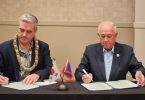The tiny Island of Nevis is on the verge of becoming the “greenest” island in the Caribbean as it sits on the threshold of harnessing geothermal energy not only for its own needs but also for the neighboring islands in the Eastern Caribbean.
Known historically as the Queen of the Caribees, Nevis’ claim to fame hitherto rested on its distinction as being the birth place of Alexander Hamilton, one of America’s greatest statesmen, and more recently, as home of the fabulous Nevis Four Seasons, one of the finest hotels in the world.
Interestingly, the Hot Water Springs in Nevis, which were discovered on the island in the 18th century, led to the opening of the Bath Hotel, the first resort of its kind in the Caribbean, which has attracted English royalty as well as the rich and famous of Europe.
In a recent interview with Nevis’ Junior Minister of Natural Resources and the Environment Carlisle Powell, he disclosed that studies were done ten years ago by the US Energy Department and the Organization of American States (OAS) that indicated that Nevis has the potential to produce 900 megawatts of electricity, which is perhaps much more than Nevis will ever need. Currently, the island only consumes 9 megawatts of power.
This geothermal project will create power through the drilling of three geothermal wells and the installation of steam turbine power units thereby reducing greenhouse gas emission and contributing to the efforts of damaging climate changes.
Powell, who is also responsible for public utilities, confidentially predicted that the production of geothermal energy in Nevis will begin in 2010 and estimated that it will cost about US$50 million to bring the project on line. When the geothermal plant is fully up and running, Nevis is expected to produce 35 megawatts of electricity.
This project is one of several major initiatives undertaken by the Nevis Reformation Party (NRP) of Premier Joseph Parry, who took office three years ago.
The 36-square-mile island, which forms part of the Twin-Island Federation of St.Kitts and Nevis, does not have the financial and technical resources to undertake this ambitious project and subsequently has reached out to regional and international agencies and institutions for assistance.
These include the United Nations Development Program, the Caribbean Community and the University of the West Indies and the University of New Zealand.
The Environment Minister Carlisle Powell said, “Nevis has also sought advice from developed countries that already produce geothermal energy and have the expertise and experience in this rapidly growing industry as the world seeks cheaper and more sustainable forms of energy.”
According to Minister Powell, Iceland that produces about 15 percent of its electricity from geothermal sources has been instrumental in providing assistance and technical expertise to the tourism dependent Island.
Earlier this year, a major geothermal conference was held on Nevis. The event attracted over 100 experts from as far a field as Germany, Mexico, Iceland New Zealand and the USA. According to officials of the Nevis Island Administration (NIA), the aims of the conference were to educate the people of Nevis on the importance of this project and to share the (geothermal) knowledge gained with other countries.
Powell said that successful negotiations between the Nevis Island Administration and West Indies Power (Nevis) Ltd (WIP), an energy development company on Nevis, have established clear-cut agreements that would govern the island’s geothermal resources in the best interest of Nevisians.
WIP is a private company that has the drilling rights for exploring and producing geothermal energy on Nevis. It also recently signed an agreement with Carbon Resource Management, a Geneva-based company, for consultancy and assistance with the certification of its 35 MW geothermal plant in Nevis, under the Clean Development Mechanism (CDM), which was established and defined under the Kyoto Protocol to the United Nations Framework Convention on Climate Change.
On a practical and economic level, the production of geothermal energy is expected to bring tremendous benefits to the picturesque Island that has a population of about ten thousand.
No one is probably more excited about the potential of the discovery of this carbon emission free form of energy than Alistair Yearwood, tourism advisor to the premier. He said, “The one thing everyone is saying categorically is that the world traveler is more concerned now about the environment than almost anything else.”
Yearwood noted that Nevis already has many tourist attractions but is also of the considered opinion that Nevis can now be rightfully acknowledged as the “greenest Island in the Caribbean.” He pointed out that the geothermal Wells are already attracting many visitors to their sites.
The tourism advisor is predicting that “Nevis will be responsible for turning the whole region, green and will also become the green giant of the Caribbean including perhaps the entire Americas.”
Mr. Yearwood added, “Per capita we will be influencing a much greater region than any other country in the world.”
Minister Powell, who is also responsible for Communications, is convinced that the discovery of geothermal energy could signify economic independence for Nevis and the basis for every other form of independence that Nevis would long for and hope to achieve.
In highlighting some of the benefits of geothermal power on the island, Mr. Powell said that it will reduce the cost of living as the country will be able to cut its electricity bill by approximately 30 percent and that the Island will be able to attract businesses which depend heavily on the usage of electricity. He estimated for example that the Nevis Four Seasons Hotel could save up to US$250,000 per year on its electricity bill.
Minister Powell has stressed that this project is not just for Nevis but the entire Caribbean noting that St. Kitts, the larger sister island, will be the first to benefit from this initiative.
Meanwhile, the United States Virgin Islands is interested in purchasing 150MW of power and the islands of Anguilla, Puerto Rico and St. Martin have all shown a keen interest in buying electricity from Nevis.
In just under a year from now when the geothermal plant in Nevis is fully operational. When it opens, Nevis will be the only country in the world that derives 100 percent of its electricity from geothermal sources and will also join an elite league of green nations that are doing something about saving the world’s fragile ecosystem.






















